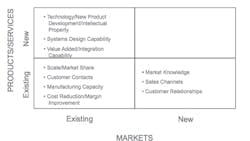Determining the True Market Value of Your Company
Selling a business is often a once in a lifetime event. As such, it is critical to do your homework in order to maximize the financial results of the sale.
As we have seen over the past few decades, acquisitions have become a commonplace strategy for public and private manufacturing companies, large and small. Whether for strategic growth or cost consolidation, there is an ever-growing thirst for manufacturing companies to focus on growth though acquisitions in order to supplement their earnings growth.
Prospective buyers may embark on either of a market driven or product/services driven acquisition strategy. As summarized in the chart below, manufacturing companies seeking to acquire companies in their existing markets and who sell similar products, are looking to consolidate their market position through facilities consolidation in an effort to gain scale and increase margins. Companies with a market orientation typically seek to acquire companies with complementary products and capabilities, thereby increasing their product offering to their customers. Likewise, companies with a product oriented strategy tend to seek out companies that can provide them access to new markets that they believe can benefit from their technology.
Strategic Reasons for Making Acquisitions
These "imbalanced" transactions occur when an acquiring company contacts a target company unsolicited. Since the target company was not looking to sell, it usually does not have a good sense for what its business is worth. The potential seller usually does not know what "multiple of earnings" its business deserves based on its size, historical operating performance and overall market growth rates. For example, a company with flat growth would typically be worth 3-4X its EBITDA (operating income before Interest, Taxes, Depreciation and Amortization). If a company is growing 10% per year, it would be worth about 5X EBITDA; 15% growth would equate to 6X and 20% growth at 10X.
In addition, privately held manufacturing companies tend to understate their earnings in order to minimize taxes; items are expensed that should be capitalized (such as equipment), owner-managers pay themselves above market rates and have above-market perks. More importantly, the potential seller does not fully understand the synergies their company can create for the potential buyer.
Because of this imbalance in experience and knowledge, I have observed that companies that are approached unsolicited typically sell for a 33% discount to their true value. Put another way, companies that embark on a professionally managed sales process will sell for 50% more than if sold to an unsolicited acquirer.
- Make sure your financial reporting is able to differentiate between the true cost of running your business and the added expenses incurred as a privately held company.
- Think about the value your company should provide to a prospective buyer;
- Are you providing market knowledge and excellent sales channels?
- Do you have unique technology that would help another company expand their product offering within a certain market segment?
- Would consolidation with another company's manufacturing operation provide significant economic savings and critical mass?
- Be aware of other transactions that are occurring in your industry;
- Why did the transaction occur?
- What did the company sell for?
- Who are other likely buyers?
- Determine how long you would like to continue to work, and how long under the ownership of another entity. In many situations, the acquiring company would like to maintain management continuity for a period of time, and therefore would require your continued involvement with the company.
- Identify a professional intermediary to assist you in a prospective sales process that has the industry knowledge required to assess the true strategic value of your company and the contacts necessary to approach decision makers at the prospective buyers.
Selling your business is often a once in a lifetime event. As such, it makes sense to maximize the financial results of the sale.
Kenneth Stern is founder and President of Synxronos, LLC, a strategy and mergers & acquisitions consultancy (www.synxronos.com).
